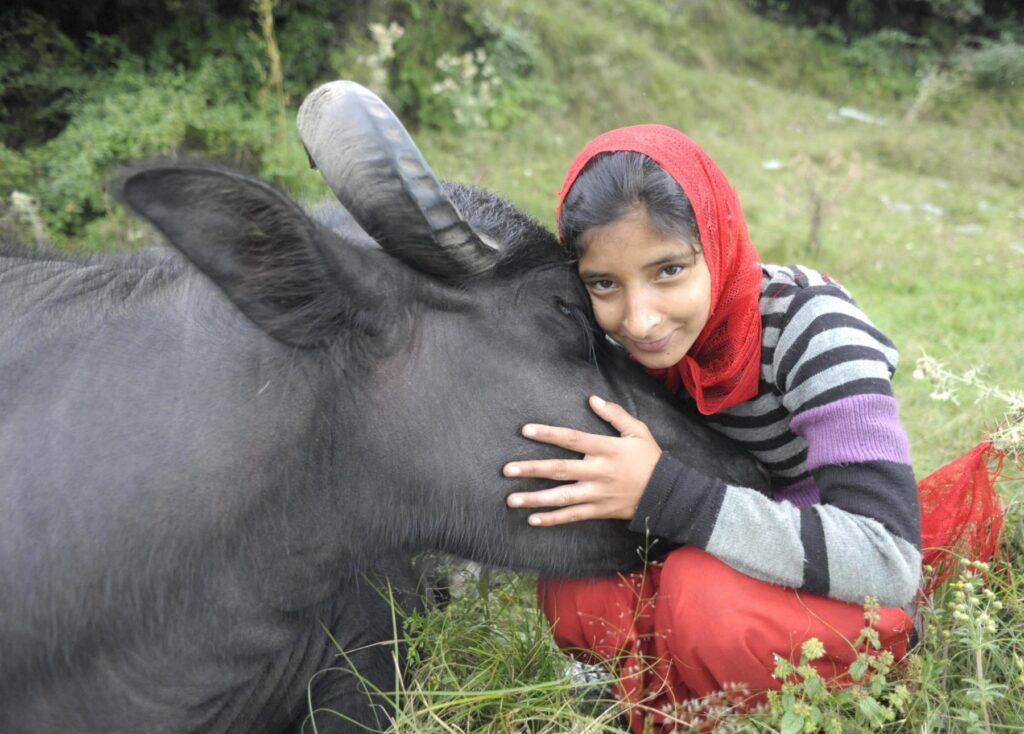Research Highlights Tenacious Pastoralists Of The Himalayas
Nov 3, 2023 | Pratirodh Bureau
A Gaddi girl and her buffalo. Climate change is shaping pastoralism’s future in the Himalayan region, with impacts on the pastoral cycle and economy (Image: Stephen Christopher)
The Gaddis are the largest pastoral community in the Indian state of Himachal Pradesh, with a population of 178,000 recorded in the most recent Indian census undertaken in 2011. Today, as climate change affects the populations of the Himalayan watershed, such a comprehensive body of research into the Gaddis is proving useful: the challenges faced by the Gaddi community, and its responses to them, allows others to clearly appreciate the contemporary struggles of pastoral communities.
In their 2021 research paper, ‘Old ways and new routes: climate threats and adaptive possibilities in the Indian Himalayas’, Richard Axelby and Maura Bulgheroni explicitly focused on pastoral communities. They highlight how rising temperatures have affected the quality of grasslands and, consequently, the health of animals that depend on them. Unusually dry monsoons or unseasonal storms can leave these soils either drier than normal, or covered in mud. The paper also notes that Gaddis face heightened risks during their migrations, because the melting of glaciers coupled with storms have led to increasing numbers of landslides.
Shepherds have responded to climate impacts in different ways: some have increased the percentage of goats in their herds, because goats can better avoid proliferating noxious plants than sheep; some have increased the number of winter grazing areas they move between to compensate for the scanter availability of desired vegetation.
Bulgheroni takes up some of these points in her article for the September 2023 issue of the journal Himalaya, which was dedicated to the Gaddi community. She contextualises climate change pressures alongside social and economic transformations – road building, education and employment opportunities, and shifts in seasonal migration – in a locality close to Bharmour, in Gadderan (the old Gaddi heartland), Himachal Pradesh.
Both Bulgheroni and Axelby argue that shepherds in the Bharmour area are proving “surprisingly tenacious”, which contradicts much commentary on the viability of pastoralism: “though the environmental niches in which pastoralism operates are undergoing dramatic alterations … the keeping of sheep and goats has transformed into an investment opportunity”. Expanding urban markets for this meat will be a critical factor in sustaining such opportunities.
A Changing Community
Aayushi Malhotra and her colleagues echo this emphasis on the resilience of Gaddi pastoralism in their 2022 paper, “Puhals: outlining the dynamics of labour and hired herding among the Gaddi pastoralists of India”. They emphasise the importance of “puhal” (hired hands) in sustaining the Gaddis’ contemporary shepherding economy, based on a study conducted in Bharmour. Gaddi shepherds have long used puhal on a small scale, or to help with temporary labour shortages.
What this first-ever examination of the puhal hiring process reveals is a new, greater reliance among flock owners on puhal. They are often hired from outside local webs of kin and increasingly from non-Gaddi and non-shepherding backgrounds. This includes hiring from beyond Himachal Pradesh. As fewer Gaddi youngsters are willing to put up with the rigours of shepherding life, puhals have become a vital means to sustain ancestral investments in the pastoral economy.
The authors suggest that the benefits of this increasing reliance on puhals will lead to significant change, because the system enables these hired hands to gain a foothold as herders themselves.
Climate change is emphatically shaping pastoralism’s future, with impacts on the pastoral cycle and economy still revealing themselves. As the aforementioned research suggests, it may be premature to conclude that Gaddi pastoralism will shortly disappear, even if its viability is increasingly secured through non-Gaddi labour. What might that mean in the longer term?
Increasing numbers of puhals, from Indian states as far away as Bihar, adds a complicating layer to simmering local disputes. The Gujjars in Himachal Pradesh are predominantly Muslim, in a state that is majority Hindu; they have a smaller population than the predominantly Hindu Gaddi community, which has traditionally dominated pastoral politics in the state. How might climate change and this expansion in non-Gaddi labour affect already fraught Gaddi-Gujjar relations?
A Lot More Research Is Needed
It is important to note that there is no single experience of Gaddi culture. In a 2022 article, Stephen Christopher says the Gaddis are classified in three distinct ways in Himachal Pradesh and Jammu & Kashmir. In Jammu, where they are the minority herding community compared to the Gujjars, they have limited leverage in the event of disputes; the reverse is true in Himachal Pradesh.
Additionally, the Gaddi community is divided along caste lines. Community members from historically repressed castes have had limited access to the rewards of the shepherding economy.
Among the five “Scheduled Caste” groups that are partially assimilated into Gaddi life, Halis have faced the most entrenched forms of casteism. This extends to their exclusion from sacred highland pasturelands, based on ritual impurity, and their general disenfranchisement from flock wealth.
These caste exclusions extend to the composition of both the Himachal Pradesh State Wool Federation and the Gaddi Welfare Board, which are key institutions in negotiating with the state for communal resources. This is an issue that remains understudied, and one which may have major impacts for the future of Gaddi access to pastureland and water resources in the context of climate change.
(Published under Creative Commons from The Third Pole. Read the original article here)
